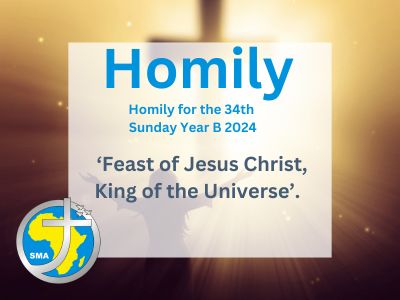Readings: Daniel 7:13-14; Apocalypse1:5-8; John 18:33b-37
The Feast of Christ the King marks the end of ordinary time and the completion of the Church’s liturgical year. It was instituted by Pope Pius XI in 1925 to promote devotion to the Universal Lordship of Christ in response to the growing secularism of the Western world – a secularism that sadly shows no signs of receding a century later. In 1969, Pope Paul VI gave the celebration the title,‘Jesus Christ, King of the Universe’, and moved it from the last Sunday in October to the last Sunday of the liturgical year. He also declared it a ‘Solemnity’, the highest rank of feasts in the Church. But what does it mean for us to worship Jesus as King of the Universe? And what kind of kingship are we celebrating?
In today’s gospel reading, Jesus, on being questioned by Pilate, does not deny that he is a king but makes it clear that his kingdom is ‘not of this world’ (Jn 18:34). This does not mean that it is a purely spiritual, other-worldly kingdom that has nothing to do with the world in which we live. On the contrary, it has everything to with this world and with our lives here and now on earth. What Jesus means is that his kingdom is utterly different from those kingdoms where rulers impose their will on people and exercise their power by force and fear – the kind of kingdom that Pilate administered as Governor of the Roman Province of Judea (cf. Mk 10:42). In contrast, the kingdom of Jesus is a kingdom conceived in the heart of God and shaped by his loving plan for us. It is, in the words of the today Eucharistic Preface, ‘an eternal and universal kingdom, a kingdom of truth and life, a kingdom of holiness and grace, a kingdom of justice, love and peace’. To see and appreciate more clearly what the Kingdom of Jesus is about, we need look no further than the testimony of the gospels about the life and public ministry of Jesus Christ.
Nothing is more certain about the life and ministry of Jesus of Nazareth than that he proclaimed the kingdom or reign of God. The phrase ‘Kingdom of God’ occurs 122 times in the Gospels, 90 of which are on the lips of Jesus. In the Synoptic Gospels Jesus’ launches his public ministry with the statement: ‘The time is fulfilled. The kingdom of God is at hand. Repent. Believe the Good News’ (Mk 1:15). God’s kingdom was not only the central theme of Jesus’ teaching; it was the event that shaped all his actions – his table-fellowship with sinners and outcasts, his healings and exorcisms, his forgiveness of sin. As lived and proclaimed by Jesus, the kingdom of God meant good news for the poor, healing for the sick, liberation for the enslaved and oppressed: ‘The Spirit of the Lord is upon me, for he has anointed me to bring good news to the afflicted. He has sent me to proclaim liberty to captives, sight to the blind, to let the oppressed go free, to proclaim a year of favour from the Lord’ (Lk 4:18-19). For Jesus, God’s kingdom involves a radical, global, and structural transformation of human life on this earth. It is a kingdom in which the entire cosmos is purified of evil and filled with the reality of God. It is a universal kingdom in which the Risen and Glorified Jesus now reigns supreme.
The kingdom Jesus proclaimed, and for which he died, was rooted in and nourished by his experience of God as loving Father – his Abba experience. Abba (dad) was the affectionate term Jewish children used to address their fathers. It connotes not just dependence, but trust and intimacy. In Jesus we meet a God who loves us without conditions or limits, a God who invites us to share the divine communion of love, and so experience the fullness of life (cf. Jn 17:24-26). The kingship of Jesus is inseparably linked to his call to conversion and the invitation to experience the wonderful closeness of Abba God. Only God’s power can overcome the evil and negativity in human life and history. We cannot do it by our own resources. What we can do is respond to the invitation of Jesus, ‘Repent and believe the good news’ (Mk1:15), and be converted to a new way of living. Then the reign of God becomes real in our lives.
Today’s celebration challenges us to give our hearts completely to Jesus Christ and invite him to reign in our lives, in our families, businesses, and in the entire world. I conclude with a reflection by Flor McCarthy SDB entitled The Kingdom of Jesus. In simple words it sums up the meaning of today’s great feast.
Jesus said, ‘My kingdom is not of this world.’
Jesus does not rule as earthly kings rule.
He has no palace, no throne, no crown, no army.
Yet we give him an allegiance and a loyalty,
which we would not give to any other person
or institution on earth.
Alone and unarmed he stood before Pilate.
Pilate had thousands of soldiers to call upon.
Jesus had none.
Yet Jesus was incomparably the greater of the two.
Jesus is the hope of the human race.
He rules, not by force, but by love.
Lord Jesus, may your kingdom come,
and may you remember me on that day.
Listen to the audio version:

